(IJCH) Continuing My Math Journey: Blaise Pascal - Inventor, Theologian, Philosopher, Writer, Scientist, and Mathematician
(IJCH) Continuing My Math Journey: Blaise Pascal - Inventor, Theologian, Philosopher, Writer, Scientist, and Mathematician
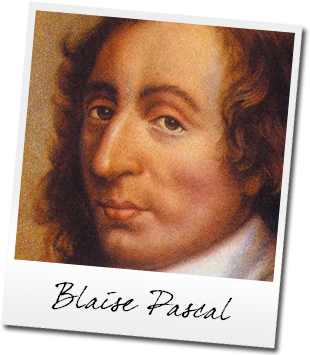
IJCH - Inside JaiChai's Head (Meaning: My Warped, Personal Opinions and Musings)

From the Author:
Salutations.
I am JaiChai.
And if I haven't had the pleasure of meeting you before, I'm delighted to make your acquaintance now.

I invite you to interact with everyone, learn, and have as much fun as possible!
For my returning online friends, "It's always great to see you again!"
Continuing My Math Journey

In my article "(IJCH) Ahmose - The Egyptian Scribe (or How Egyptian Mathematics Predated and Significantly Influenced Greek Mathematicians)", I explained why I decided to completely overhaul my severely degraded math knowledge and skills; mainly, in order to learn Haskell programming.
See:
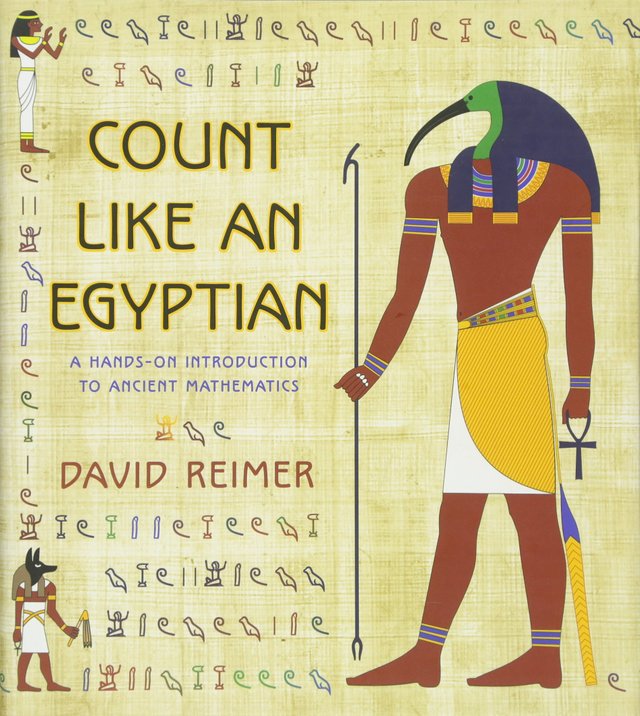
Article Link:
Haskell is a functional programming language based on Lambda Calculus.
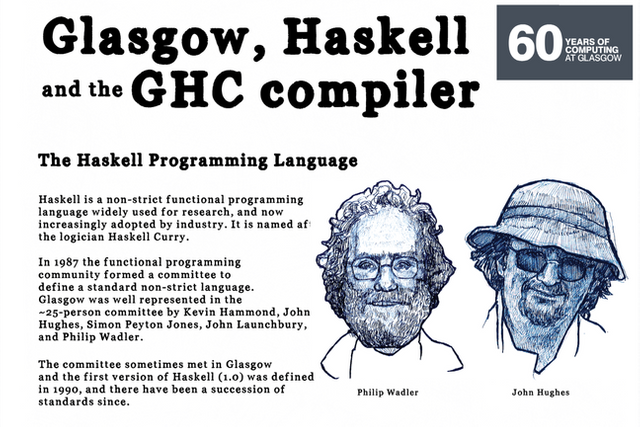
Since Calculus uses algebra, trigonometry and geometry, I needed to make sure my understanding of them was sufficient enough to encode expressions in Lambda Calculus.
The reeducation process inspired the following articles:

Article Link:
https://steemit.com/math/@jaichai/ijch-seriously-all-this-math-came-from-india
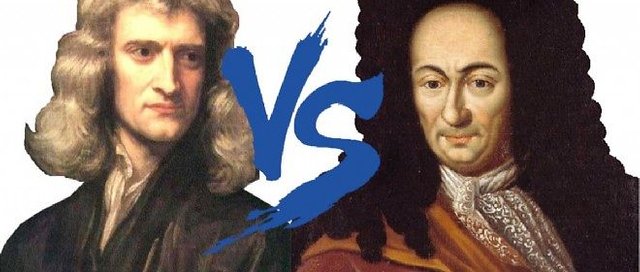
Article Link:
https://steemit.com/math/@jaichai/ijch-the-clash-of-the-calculus-titans
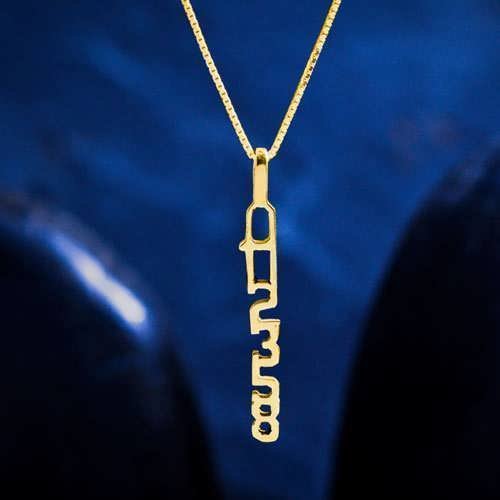
Article Link:
https://steemit.com/science/@jaichai/ijch-the-other-leonardo
Surprisingly, my math journey has not been as difficult as I previously predicted.
In fact, it's been a blast!
Why?
Instead of memorization and tedious repetition, I relearned mathematics from the vantage point of a Historian of Human Civilization.
Consequently, I have avoided the traditional, boring methods of math learning that put me to sleep in high school (BTW, I quit High School before I was 13 y/o).
This article will discuss a famous mathematician; a polymath who is also well known as an inventor, theologian, philosopher, and writer.
His name is Blaise Pascal.
Blaise Pascal's Life
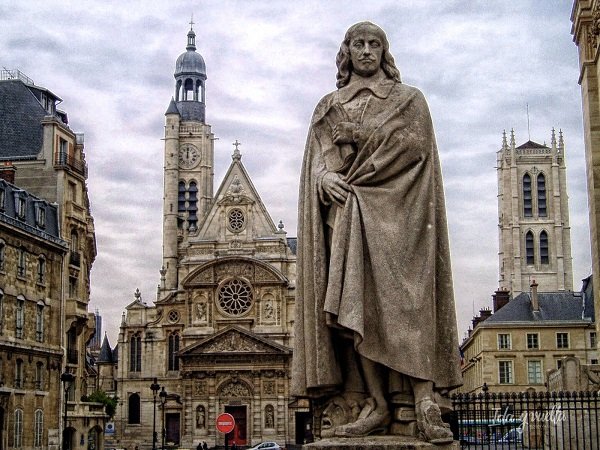
Blaise Pascal was a French mathematician who lived from 9 June, 1623 to 19 August, 1662.
He was the only son of four children.
Tragically, his mother died when he was three years-old.
He was a child prodigy who was educated by his father (Étienne Pascal), a mathematician and tax collector in Rouen.
In spite of the father's wishes to delay his math education (his father was afraid that his son would be so enamored with math that he would neglect all else), Blaise secretly studied math.
In fact, at the age of 12 years-old, he deduced that the sum of triangles equaled two right angles.
After that, his father acquiesced and gave Blaise a book on Euclidean Geometry.
Between 1658 and 1659 Pascal investigated geometry and physics; resulting in a publication on the cycloid and its use in calculating the volume of solids.
Chronically ill, Pascal was plagued with debilitating ailments; barely enduring his poor health all of his short life, especially after the age of 18.
He died just two months after his 39th birthday.
Pascal - The Inventor

As a teenager in 1642, Pascal began some trailblazing research on calculating machines.
Three years later, he had produced 50 prototypes and over the next 10 years, he built 20 finished machines (called Pascal's calculators and later the "Pascalines").
This makes Pascal one of the first two inventors of the mechanical calculator; the other being a man of the Renaissance era named Wilhelm Schickard.
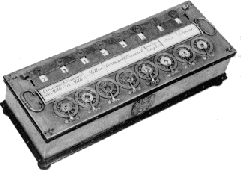
Pascal's law (also Pascal's principle or the principle of transmission of fluid-pressure) is a principle in fluid mechanics that states that a pressure change occurring anywhere in a confined incompressible fluid is transmitted throughout the fluid such that the same change occurs everywhere.
"Pascal's Law" is behind the invention of the hydraulic press.
See:
Blaise Pascal introduced a very primitive version of the roulette machine (meaning "little wheel") in the 17th century.
The roulette machine was a by-product of Blaise Pascal's efforts to create an uninterrupted motion machine (aka perpetual motion device).
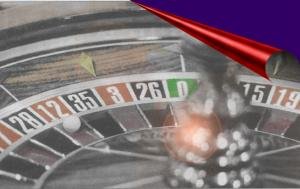
Pascal - The Theologian

In 1646, Pascal and his sister Jacqueline joined the religious movement within Catholicism known by its detractors as Jansenism.
Following a religious experience from a near fatal carriage accident in late 1654, Pascal started publishing many influential works on philosophy and theology.
Two of his well known works on theology are the "Lettres provinciales" and the "Pensées".
Pascal's perspective is rather cynical; that is, all humans are "born into a duplicitous world that shapes us into duplicitous subjects and so we find it easy to reject God continually and deceive ourselves about our own sinfulness".
Later in the "Pensées", he used a probabilistic argument, Pascal's Wager, to justify belief in God and a virtuous life.
After that religious experience in 1654, Pascal mostly gave up work in mathematics.
Pascal's Wager
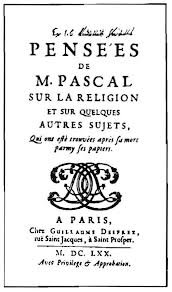
Pascal argues that a rational person should live as though God exists and seek to believe in God. If God does not actually exist, such a person will have only a finite loss (some pleasures, luxury, etc.), whereas they stand to receive infinite gains (as represented by eternity in Heaven) and avoid infinite losses (eternity in Hell).
Pascal's Wager was based on the idea of the Christian God, though similar arguments have occurred in other religious traditions.
Historically, Pascal's Wager was groundbreaking because it charted new territory in probability theory, marked the first formal use of decision theory, and anticipated future philosophies such as existentialism and pragmatism.

The Wager uses the following logic (excerpts from Pensées, part III, §233):
God is, or God is not. Reason cannot decide between the two alternatives.
A Game is being played... where heads or tails will turn up.
You must wager (it is not optional).Let us weigh the gain and the loss in wagering that God is. Let us estimate these two chances. If you gain, you gain all; if you lose, you lose nothing.
Wager, then, without hesitation that He is. (...) There is here an infinity of an infinitely happy life to gain, a chance of gain against a finite number of chances of loss, and what you stake is finite.
And so our proposition is of infinite force, when there is the finite to stake in a game where there are equal risks of gain and of loss, and the infinite to gain.
But some cannot believe. They should then 'at least learn your inability to believe...' and 'Endeavour then to convince' themselves.
Pascal - The Philosopher
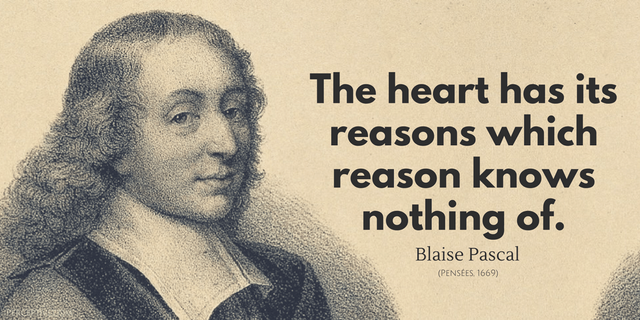
Descartes was a contemporary of Pascal and influenced much of his philosophical views.
Differences and Similarities Between Descartes and Pascal
Like Blaise Pascal, Descartes is a great mathematician and also a great philosopher in French history.
Both Descartes and Pascal emphasized the importance of thinking in their philosophy, but Pascal gave more stress on human senses than Descartes. Pascal was a pious Jansenist, and he believed that God is to be sensed, not to be known through reason.
Moreover, while Descartes thought our mind and body are separate, and man lives by mind, Pascal argued that human mind and body are connected and unified.
There are many famous philosophical quotes by Pascal, but here is my favorite one:
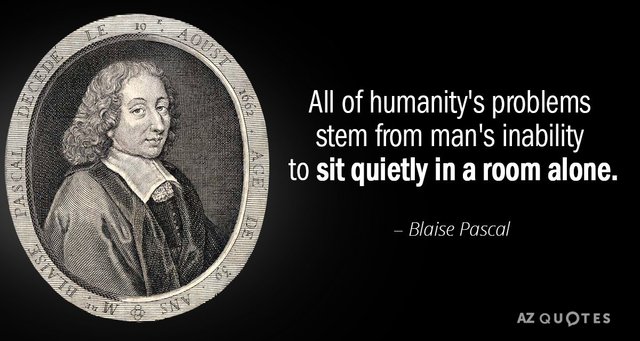
Pascal - The Writer
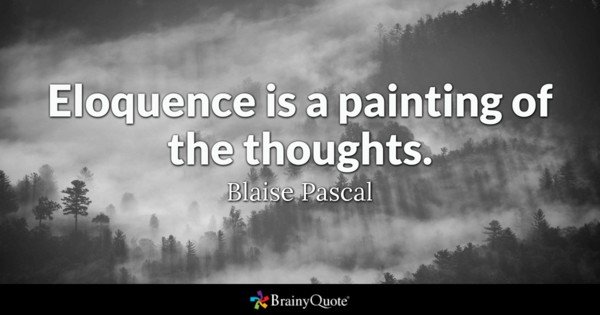
In literature, Pascal is one of the most influential authors of the French Classical Period.
To this day, his writings are avidly read worldwide and he is regarded as one of the greatest masters of French prose.
His use of satire and wit is legendary.
Years later, Pascal's concepts are seen in much of the literature produced by the polemicists.
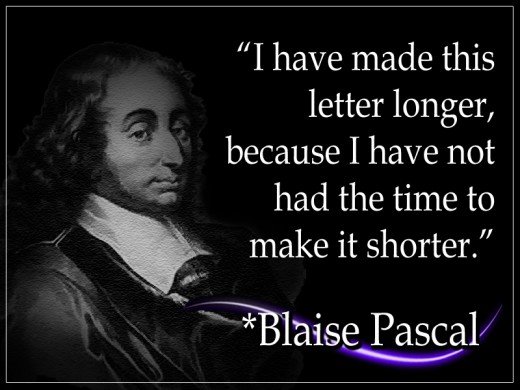
Pascal - The Scientist
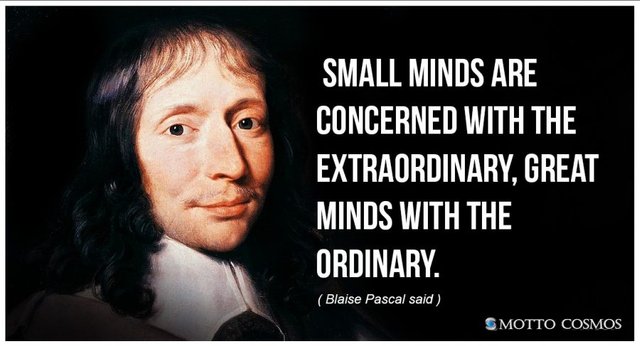
Pascal's research on hydrodynamics and hydrostatics were based on the principles of hydraulic fluids.
Unbeknownst to most people, Pascal's studies of hydrodynamics resulted in his creation of the syringe.
Pascal proved that hydrostatic pressure does not depend on the weight of the fluid but on the elevation difference. In Pascal's barrel experiment, he demonstrated this principle by attaching a thin tube to a barrel full of water.
Then he filled the tube with water up to the level of the third floor of a building; thus resulting in the barrel to leak from the pressure.
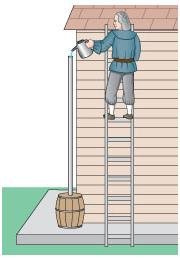
The SI unit of pressure is named after Pascal as a tribute to his contributions in the field of hydrodynamics and hydrostatics.
The name Pascal has been given to a programming language (by Niklaus Wirth in recognition of Pascal's early calculator/computer prototype).
One of the Universities of Clermont-Ferrand, France – Université Blaise Pascal – is named after him for his many contributions to so many diverse fields of study.
Pascal - The Mathematician

Pascal and Fermat solve "The Problem of Points"

The problem of points, also called the problem of division of the stakes, is a classical problem in probability theory.
One of the famous problems that motivated the beginnings of modern probability theory in the 17th century, it led Blaise Pascal to the first explicit reasoning about what today is known as an expected value.
The problem concerns a game of chance with two players who have equal chances of winning each round.
The players contribute equally to a prize pot, and agree in advance that the first player to have won a certain number of rounds will collect the entire prize.
Now suppose that the game is interrupted by external circumstances before either player has achieved victory.
How does one then divide the pot fairly?
It is tacitly understood that the division should depend somehow on the number of rounds won by each player, such that a player who is close to winning will get a larger part of the pot.
But the problem is not merely one of calculation; it also includes deciding what a "fair" division should mean in the first place.
See:
Pierre de Fermat solved the Problem of Points first, but his solution was based on lengthy empirical studies.
In contrast Pascal's solution was based on his new mathematical invention "Probability Theory" - which led to the development of modern economics and social science.
Pascal wrote an important treatise on the subject of projective geometry at the age of 16.
His Traité du triangle arithmétique ("Treatise on the Arithmetical Triangle") of 1653 described a convenient tabular presentation for binomial coefficients, now called Pascal's triangle.
Pascal's Triangle
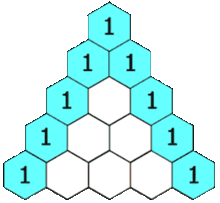
Pascal's triangle is a triangular pattern of numbers in which each number is equal to the sum of the two numbers immediately above it.
Although named after Blaise Pascal, this arithmetic triangle has been known about since at least the twelfth century and has a variety of other names.
Indian mathematicians wrote about the triangle thousands of years ago. Not surprisingly, in India, the triangle is called the "Staircase of Mount Meru"
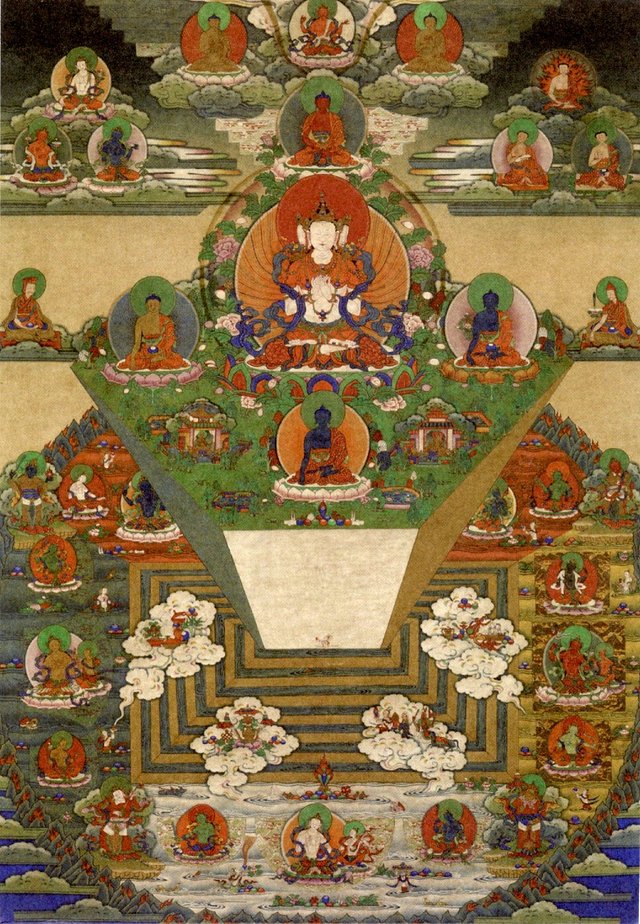
In China, the triangle is named "Yang Hui's Triangle" after Yang Hui, a minor Chinese official who wrote two books, dated 1261 and 1275, that uses decimal fractions (long before they appeared in the West) and contain one of the earliest accounts of the triangle.
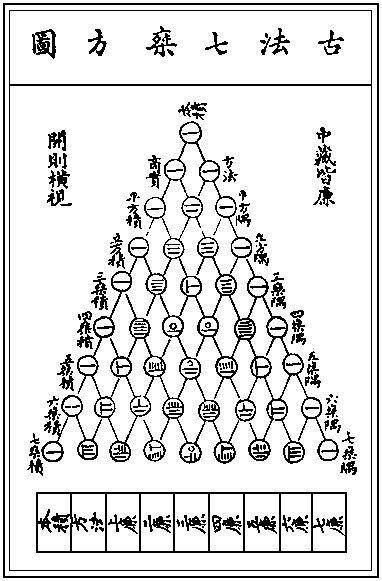
Around the same time, Omar Khayyaam, a Persian mathematician and astronomer, also wrote about the triangle; hence, it is named "Khayyam's Triangle" in the regions around Iran.
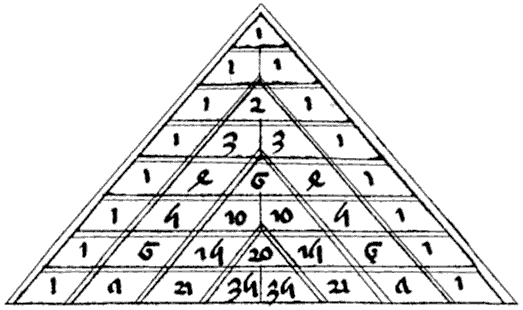
In Italy, it is called "Tartaglia's triangle" (after Niccolò Fontana Tartaglia, a late 14th century Venetian mathematician and engineer who also worked with the triangle).
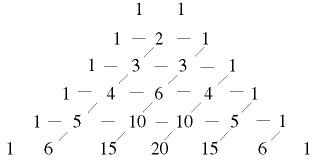
Nevertheless, Pascal's formalization of the triangle's properties and additional insights about it has resulted in the most accepted/recognized name of it - "Pascal's Triangle".
See:
Lastly, Pascal and Fermat's work into the calculus of probabilities laid down the foundation for Newton and Leibniz' formulas for modern calculus.
Conclusion
All my life I have been accused of being a scatter brained, absent-minded dreamer; a tragic jack of all trades - master of none type who was always "spread too thin over hundreds of unrelated activities".
Stubbornly, I've clung to my belief that one does not have to limit one's interests and activities to just one domain in order to reach proficiency.
And the stories of people like Blaise Pascal provide tremendous reassurance that I was right all along.
Nowadays, titans of innovation strive to pursue as many interests and conduct as many experiments as humanly possible.
This strategy has proven to be the "secret" of genius (and usually the fast track to prodigious success) because it puts the law of averages on their side (a la Edison's "discovery" of a long-lasting light bulb).
Initially, while continuing on my math journey, I investigated Blaise Pascal solely because of his famous contributions to math.
Quickly, it was clear that math was just one of his many interests and endeavors. The sheer number of his amazing achievements - in so many different fields of study - is mind- boggling.
That's why every time I come across polymaths like Pascal, I am more inspired and determined to "follow the thread" to some satisfying endpoint - no matter where the path leads.
Parting Shots


Thanks so much for accompanying me on my math journey!
By JaiChai
Truly hope to see you again.

About the Author
Believing that school was too boring, he dropped out of High School early; only to earn an AA, BS and MBA in less than 4 years much later in life – while working full-time as a Navy/Marine Corps Medic.
In spite of a fear of heights and deep water, he performed high altitude, free-fall parachute jumps and hazardous diving ops in deep, open ocean water.
After 24 years of active duty, he retired in Asia.
Since then, he's been a full-time, single papa and actively pursuing his varied passions (Writing, Disruptive Technology, Computer Science and Cryptocurrency - plus more hobbies too boring or bizarre for most folk).
He lives on an island paradise with his teenage daughter, longtime girlfriend and three dogs.




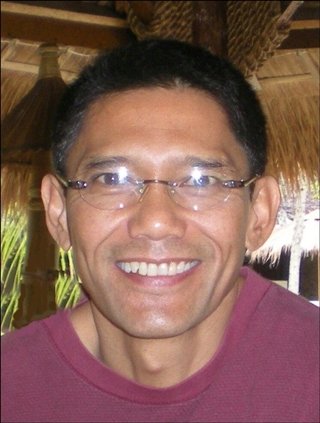

Thank you for this. I am a fan of math history and Pascal is a most important figure. He did so much for the field of mathematics, particularly for probability.
I do take some pity that outside of mathematics, he is most famous for Pascal's wager. It's interesting philosophical and theological reasoning, but not very scientific. Thank you for sharing more about this great scientist.
An interesting post Mathematics was my favorite subject at school but I think I have perhaps forgotten more than I ever learned lOL
I empathize...
Thanks for visiting and commenting.
Namaste, JaiChai